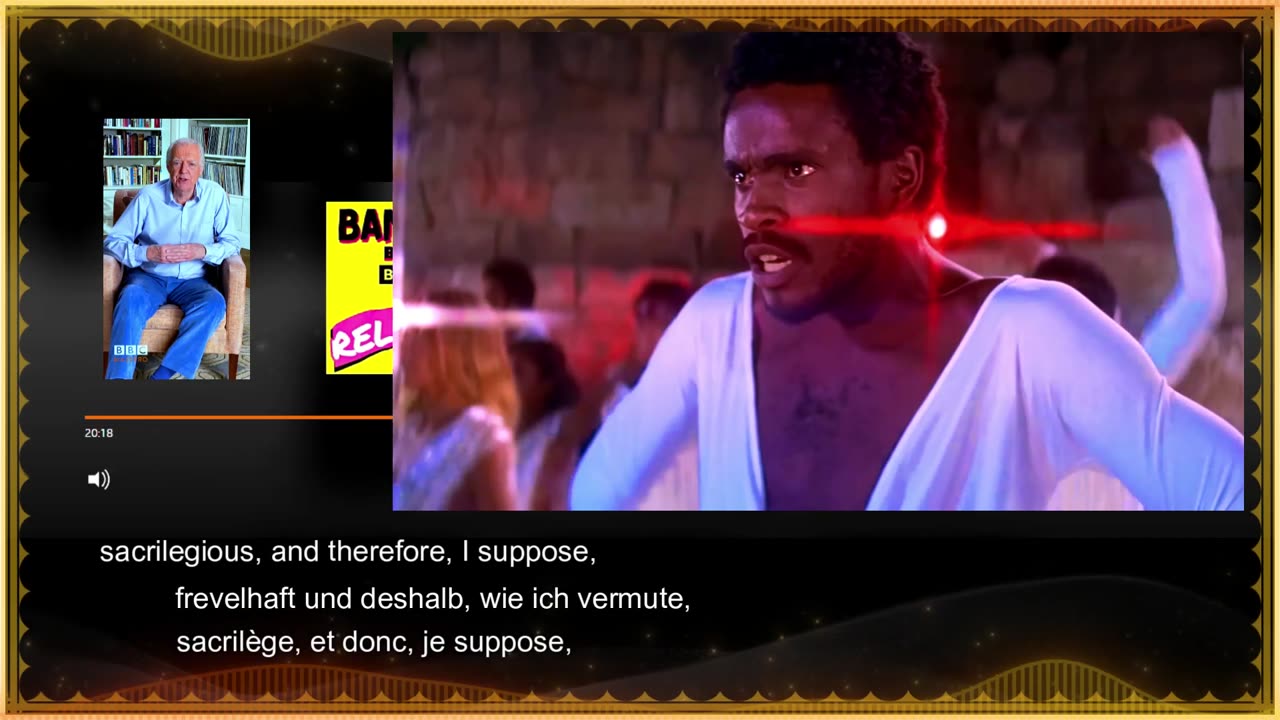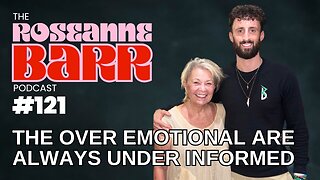Premium Only Content

"BBC's Holy Panic: How banned songs turned to gold"
First of all: remember—it's a podcast! Everyone—yes, everyone, video inserts are artistic license, thank you! This episode of the BBC podcast series Banned by the BBC, hosted by Declan Harvey, dives into the fascinating intersection of religion and music, examining songs the BBC once deemed too risky for airplay. Featuring Sir Tim Rice, the lyricist behind Jesus Christ Superstar, and Reverend Cindy Kent, a former singer turned vicar, the episode explores why tracks like Elvis Presley’s Peace In the Valley, Don Cornell’s Hold My Hand, Libby Holman’s Love for Sale, Cliff Richard’s The Millennium Prayer, and Superstar from Jesus Christ Superstar faced BBC scrutiny or outright bans. The podcast, enhanced with music videos and speaker overlays, runs for 31 minutes and weighs in at 2.6GB, complete with BBC subtitles for accessibility.
Analysis of the Controversy and BBC’s Role:
Why the Bans? The BBC’s historical decisions to restrict these songs often stemmed from a hyper-cautious approach to avoid offending audiences, particularly when public funds were at stake. For instance:
Hold My Hand (1954) by Don Cornell was flagged for linking romantic love with religious imagery like “the kingdom of heaven,” which some at the BBC found inappropriate. Reverend Kent humorously dismisses this as musically offensive rather than blasphemous, noting that even the Archbishop of Canterbury dodged commenting by claiming he was too busy for pop music.
Love for Sale by Libby Holman was banned due to its reference to prostitution, despite its artistic merit. Kent questions the logic, pointing out that biblical figures like Mary Magdalene were prostitutes, yet the BBC drew a hard line.
The Millennium Prayer by Cliff Richard, a setting of the Lord’s Prayer, was snubbed by Radio 1 and Radio 2 producers in 1999, not for explicit content but for being “too religious” or “naff.” This omission sparked controversy, ironically boosting its visibility.
Superstar from Jesus Christ Superstar faced restricted airplay in the early 1970s, as the BBC feared its depiction of Judas questioning Jesus’s divinity might cross into blasphemy. Sir Tim Rice counters that the song reflects Judas’s perspective, not a denial of Jesus’s divinity, and notes the BBC’s restrictions were more about sidestepping potential backlash than an official ban.
BBC’s 2025 Podcast Redemption Arc: The BBC’s decision to produce this podcast in 2025 is a commendable, if cheeky, move to revisit its past censorship missteps. By airing these stories, the BBC acknowledges its overly cautious history while capitalizing on the nostalgia and intrigue of banned music. It’s a clever way to reframe past “misdeeds” as content gold, engaging modern audiences with a mix of historical critique and entertainment. The inclusion of high-profile guests like Sir Tim Rice adds credibility and star power, ensuring the podcast resonates with both music fans and those curious about cultural history.
Profiting from Past Bans: The podcast subtly highlights how bans often backfired, boosting the banned songs’ popularity through the “oxygen of publicity.” For example, Cliff Richard’s Millennium Prayer likely sold more due to the controversy, and Jesus Christ Superstar became a global hit despite initial BBC hesitance. The BBC now profits from this podcast, while artists like Sir Tim Rice continue to earn from their enduring works. Rice’s involvement in Jesus Christ Superstar, a cultural juggernaut, underscores his savvy as a music marketer, turning a controversial narrative into a lucrative musical empire.
Sir Tim Rice’s Knighthood: Sir Tim Rice was knighted in 1994 for his contributions to music and theater, particularly for his work on musicals like Jesus Christ Superstar, Evita, and The Lion King. His ability to craft compelling, commercially successful narratives, often with a provocative edge, cemented his status as a cultural icon. The podcast doesn’t delve into his knighthood, but his title adds gravitas to his commentary, reinforcing his role as a titan in the industry.
Humorful Video Description:
Banned by the BBC: The Holy Rollercoaster of Censored Tunes!
Buckle up for a 31-minute, 2.6GB divine comedy where the BBC confesses its sins of banning songs for being too heavenly—or just too catchy! In this episode, host Declan Harvey plays musical archaeologist, unearthing tracks the BBC once deemed too spicy for the airwaves. From Elvis Presley’s gospel croon Peace In the Valley to Cliff Richard’s Millennium Prayer (the Lord’s Prayer remix nobody asked for), the BBC’s moral panic is laid bare with a side of snark.
Sir Tim Rice, the knighted lyricist who turned Judas into a rock star with Jesus Christ Superstar, steals the show, shrugging off the BBC’s 1970s jitters over his “blasphemous” banger Superstar. Meanwhile, Reverend Cindy Kent, a vicar with a pop past, delivers zingers like calling Don Cornell’s Hold My Hand musically offensive but religiously harmless. The podcast’s pimped-out visuals—music videos spliced in at key moments and speaker overlays to keep you clued in—make it a feast for eyes and ears. Subtitles in English, French, and German ensure no one misses the shade.
Why did the BBC ban these tunes? Think pearl-clutching producers terrified of mixing love with heaven or Judas questioning Jesus’s PR strategy. The reasons are as laughable as a 1950s censor sending a song to the Archbishop for a vibe check (spoiler: he was “too busy”). Fast-forward to 2025, and the BBC’s cashing in on its own oopsies with this podcast, while Sir Tim Rice and pals keep raking in royalties from their “controversial” hits. It’s a masterclass in music marketing: get banned, get famous, get paid. Watch these savvy songsmiths turn censorship into a goldmine, and join the giggle-fest as the BBC eats humble pie with a side of chart-toppers!
Notes:
The podcast’s exploration of blasphemy is delightfully inconclusive, with Kent admitting it’s hard to pin down what’s truly offensive. This mirrors the BBC’s historical struggle to balance public taste with artistic freedom.
Your understanding is spot-on: the BBC’s podcast is both a mea culpa and a savvy move to monetize its past, while Rice’s enduring success with Jesus Christ Superstar highlights his knack for turning controversy into profit.
For further details on SuperGrok or xAI’s API, check https://x.ai/grok or https://x.ai/api, but this podcast is free to enjoy on BBC Sounds: https://www.bbc.co.uk/sounds/play/m002dcgy.
--
LightFountain18
@TubeDube6
Jesus Christ Superstar - Superstar (1970)
--
@TUNEMusicalMoments
Superstar (Carl Anderson) | Jesus Christ Superstar (1973) | TUNE
--
Cliff Richard - The Millennium Prayer (An Audience with... Cliff Richard, 13.11.1999)
--
Don Cornell Hold My Hand
Jamie4797
--
Peace in the Valley – Elvis Presley, 777 G2
--
Jesus Christ Superstar Superstar
Caitlin Graeber
--
LOVE FOR SALE by Libby Holman
cdbpdx
Last but not least: remember—it's a podcast! Everyone—yes, everyone, video inserts are artistic license, thank you!
That's all!
-
 1:07:15
1:07:15
Candace Show Podcast
5 hours agoINFILTRATION: Charlie Kirk Was Being Tracked For Years. | Candace Ep 256
60.2K232 -
 LIVE
LIVE
Rallied
4 hours ago $1.32 earnedWarzone Solo Challenges then RedSec Domination
187 watching -
 2:34:30
2:34:30
Red Pill News
6 hours agoBoomerang Time - DOJ Investigating BLM Fraud on Red Pill News Live
44.7K10 -
 1:46:14
1:46:14
Roseanne Barr
6 hours ago“The Over Emotional Are Always Under Informed” | The Roseanne Barr Podcast #121
81.6K47 -
 3:24:28
3:24:28
Nerdrotic
8 hours ago $10.92 earnedThe WitcHER DOA | Box Office Massacre | Massive Industry Layoffs - Friday Night Tights 378
47.6K8 -
 14:54
14:54
IsaacButterfield
16 hours ago $4.04 earnedShe Called Out “Creepy Men It Didn’t End Well
25K47 -
 11:43:21
11:43:21
LFA TV
1 day agoLIVE & BREAKING NEWS! | FRIDAY 10/31/25
190K46 -
 1:08:42
1:08:42
vivafrei
6 hours agoEric Swalwell in Trouble Again? RFK Jr. "Reverses Course" on Tylenol & Autism? Arctic Frost & MORE!
83.8K38 -
 1:19:51
1:19:51
DeVory Darkins
8 hours agoNewsom EXPOSED after latest bombshell and Democrats pulls shocking stunt regarding shutdown
81.2K37 -
 25:29
25:29
Stephen Gardner
7 hours ago💣 Trump White House UNEXPECTED Move + Thune DESTROYS Schumer on Senate Floor!!
37.2K38